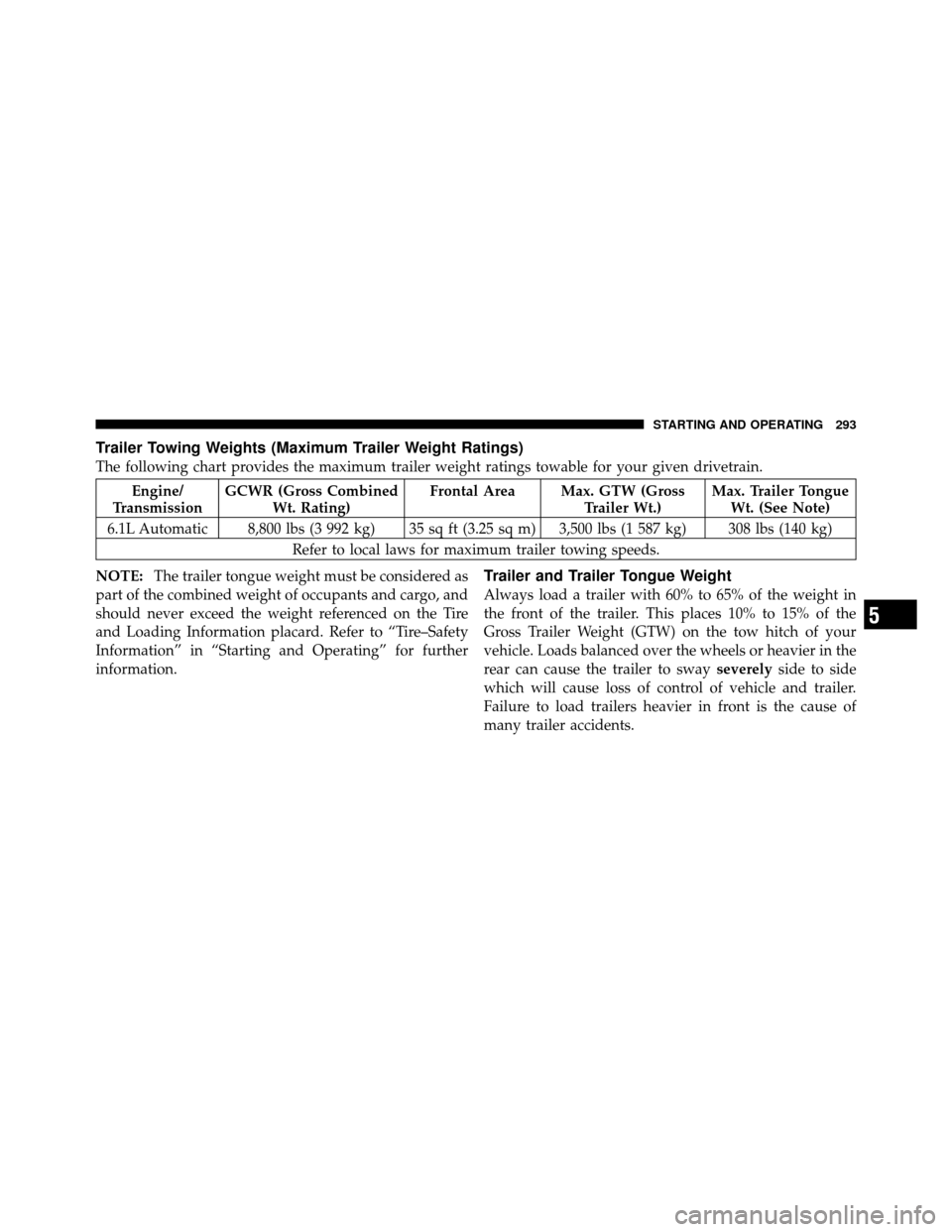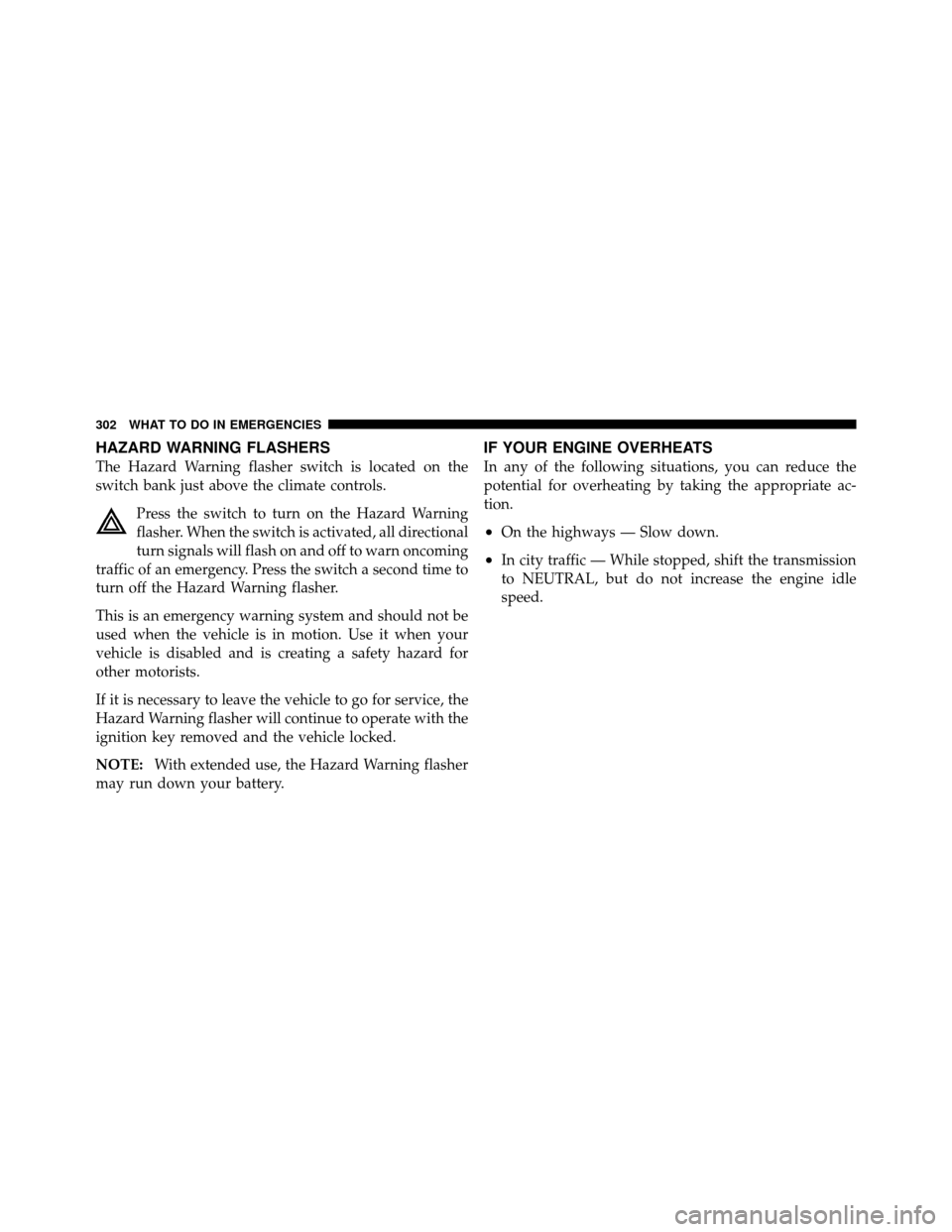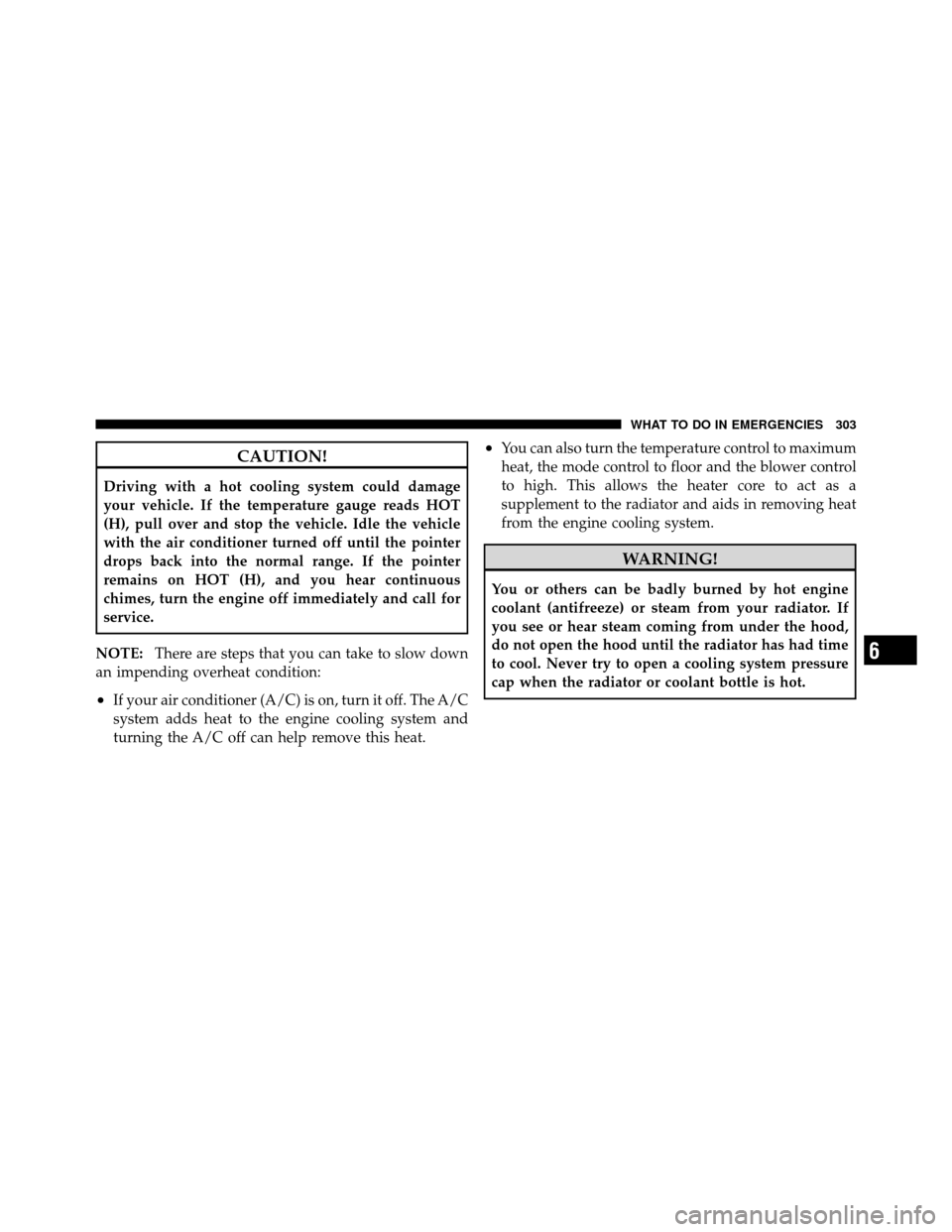Page 294 of 407

Trailer Towing Weights (Maximum Trailer Weight Ratings)
The following chart provides the maximum trailer weight ratings towable for your given drivetrain.
Engine/
Transmission GCWR (Gross Combined
Wt. Rating) Frontal Area Max. GTW (Gross
Trailer Wt.)Max. Trailer Tongue
Wt. (See Note)
6.1L Automatic 8,800 lbs (3 992 kg) 35 sq ft (3.25 sq m) 3,500 lbs (1 587 kg) 308 lbs (140 kg) Refer to local laws for maximum trailer towing speeds.
NOTE: The trailer tongue weight must be considered as
part of the combined weight of occupants and cargo, and
should never exceed the weight referenced on the Tire
and Loading Information placard. Refer to “Tire–Safety
Information” in “Starting and Operating” for further
information.
Trailer and Trailer Tongue Weight
Always load a trailer with 60% to 65% of the weight in
the front of the trailer. This places 10% to 15% of the
Gross Trailer Weight (GTW) on the tow hitch of your
vehicle. Loads balanced over the wheels or heavier in the
rear can cause the trailer to sway severelyside to side
which will cause loss of control of vehicle and trailer.
Failure to load trailers heavier in front is the cause of
many trailer accidents.
5
STARTING AND OPERATING 293
Page 296 of 407

Towing Requirements
To promote proper break-in of your new vehicle drive-
train components the following guidelines are recom-
mended:
CAUTION!
•Do not tow a trailer at all during the first 500 miles
(805 km) the new vehicle is driven. The engine,
axle or other parts could be damaged.
•Then, during the first 500 miles (805 km) that a
trailer is towed, do not drive over 50 mph
(80 km/h) and do not make starts at full throttle.
This helps the engine and other parts of the
vehicle wear in at the heavier loads.
WARNING!
Improper towing can lead to an injury accident.
Follow these guidelines to make your trailer towing
as safe as possible:
•Make certain that the load is secured in the trailer
and will not shift during travel. When trailering
cargo that is not fully secured, dynamic load shifts
can occur that may be difficult for the driver to
control. You could lose control of your vehicle and
have an accident.
•When hauling cargo or towing a trailer, do not
overload your vehicle or trailer. Overloading can
cause a loss of control, poor performance or dam-
age to brakes, axle, engine, transmission, steering,
suspension, chassis structure or tires.(Continued)
5
STARTING AND OPERATING 295
Page 299 of 407

WARNING!
•Do not connect trailer brakes to your vehicle’s
hydraulic brake lines. It can overload your brake
system and cause it to fail. You might not have
brakes when you need them and could have an
accident.
•Towing any trailer will increase your stopping
distance. When towing you should allow for addi-
tional space between your vehicle and the vehicle
in front of you. Failure to do so could result in an
accident.
Towing Tips
Before setting out on a trip, practice turning, stopping
and backing the trailer in an area away from heavy
traffic.
Automatic Transmission
The DRIVE range can be selected when towing. How-
ever, if frequent shifting occurs while in this range, use
the AutoStick�feature (D-) to select a lower gear range.
NOTE: Using a lower gear range while operating the
vehicle under heavy operating conditions will improve
performance and extend transmission life by reducing
excessive shifting and heat build up. This action will also
provide better engine braking.
The automatic transmission fluid and filter should be
changed if you REGULARLY tow a trailer for more than
45 minutes of continuous operation. Refer to “Mainte-
nance Schedule” for the proper maintenance intervals.
Electronic Speed Control – If Equipped
�
Do not use in hilly terrain or with heavy loads.
298 STARTING AND OPERATING
Page 300 of 407
�When using the speed control, if you experience speed
drops greater than 10 mph (16 km/h), disengage until
you can get back to cruising speed.
�Use speed control in flat terrain and with light loads to
maximize fuel efficiency.
Cooling System
To reduce potential for engine and transmission over-
heating, take the following actions:
�City Driving
When stopped for short periods of time, shift the trans-
mission into NEUTRAL and increase engine idle speed.
�Highway Driving
Reduce speed.
�Air Conditioning
Turn off temporarily.
RECREATIONAL TOWING (BEHIND
MOTORHOME, ETC.)
Recreational towing is not allowed.
CAUTION!
Towing this vehicle with any of its wheels on the
ground can cause severe transmission and/or transfer
case damage. Damage from improper towing is not
covered by your new vehicle warranty.
5
STARTING AND OPERATING 299
Page 302 of 407
WHAT TO DO IN EMERGENCIES
CONTENTS
�Hazard Warning Flashers ................ 302
� If Your Engine Overheats ................ 302
� Jacking And Tire Changing ............... 304
▫ Run Flat Tires ....................... 304
� Jump-Starting Procedures ................ 304 ▫
Preparations For Jump-Start ............. 305
▫ Jump-Starting Procedure ............... 306
� Emergency Tow Hooks — If Equipped ...... 308
� Towing A Disabled Vehicle ............... 309
6
Page 303 of 407

HAZARD WARNING FLASHERS
The Hazard Warning flasher switch is located on the
switch bank just above the climate controls.Press the switch to turn on the Hazard Warning
flasher. When the switch is activated, all directional
turn signals will flash on and off to warn oncoming
traffic of an emergency. Press the switch a second time to
turn off the Hazard Warning flasher.
This is an emergency warning system and should not be
used when the vehicle is in motion. Use it when your
vehicle is disabled and is creating a safety hazard for
other motorists.
If it is necessary to leave the vehicle to go for service, the
Hazard Warning flasher will continue to operate with the
ignition key removed and the vehicle locked.
NOTE: With extended use, the Hazard Warning flasher
may run down your battery.
IF YOUR ENGINE OVERHEATS
In any of the following situations, you can reduce the
potential for overheating by taking the appropriate ac-
tion.
•On the highways — Slow down.
•In city traffic — While stopped, shift the transmission
to NEUTRAL, but do not increase the engine idle
speed.
302 WHAT TO DO IN EMERGENCIES
Page 304 of 407

CAUTION!
Driving with a hot cooling system could damage
your vehicle. If the temperature gauge reads HOT
(H), pull over and stop the vehicle. Idle the vehicle
with the air conditioner turned off until the pointer
drops back into the normal range. If the pointer
remains on HOT (H), and you hear continuous
chimes, turn the engine off immediately and call for
service.
NOTE: There are steps that you can take to slow down
an impending overheat condition:
•If your air conditioner (A/C) is on, turn it off. The A/C
system adds heat to the engine cooling system and
turning the A/C off can help remove this heat.
•You can also turn the temperature control to maximum
heat, the mode control to floor and the blower control
to high. This allows the heater core to act as a
supplement to the radiator and aids in removing heat
from the engine cooling system.
WARNING!
You or others can be badly burned by hot engine
coolant (antifreeze) or steam from your radiator. If
you see or hear steam coming from under the hood,
do not open the hood until the radiator has had time
to cool. Never try to open a cooling system pressure
cap when the radiator or coolant bottle is hot.
6
WHAT TO DO IN EMERGENCIES 303
Page 306 of 407
WARNING!
When temperatures are below the freezing point,
electrolyte in a discharged battery may freeze. Do not
attempt jump-starting because the battery could rup-
ture or explode and cause personal injury. Battery
temperature must be brought above freezing point
before attempting a jump-start.
Preparations for Jump-Start
The battery in your vehicle is located in the front of the
engine compartment, behind the left headlight assembly.
Positive Battery Post
6
WHAT TO DO IN EMERGENCIES 305